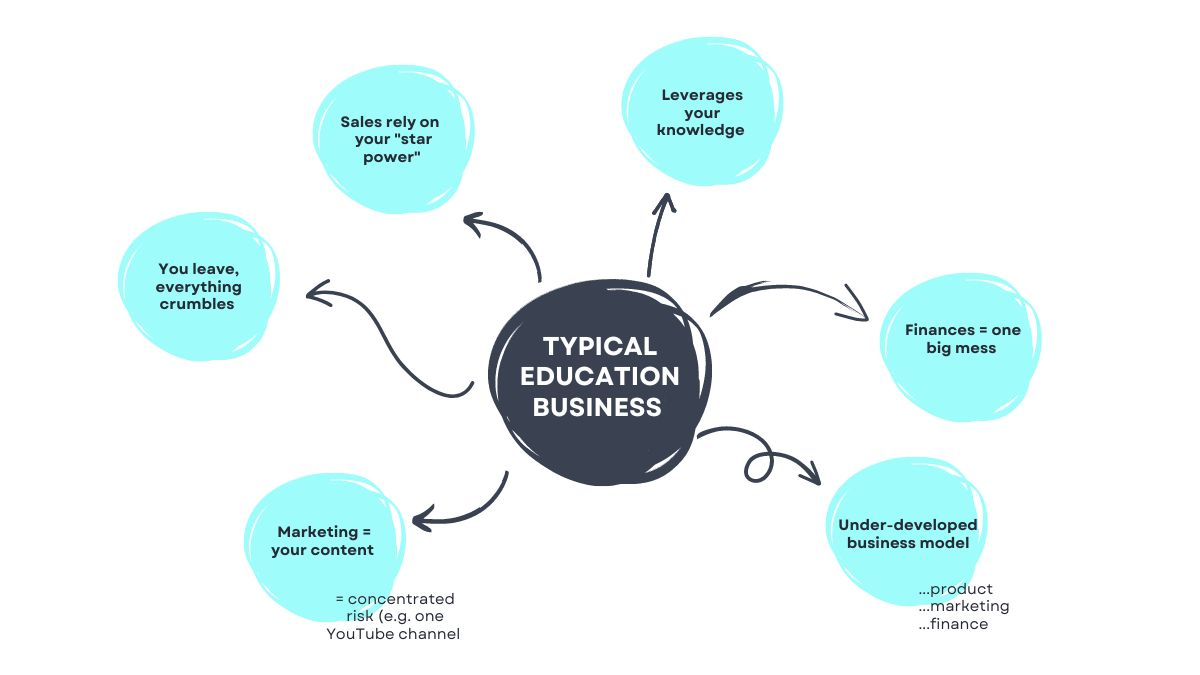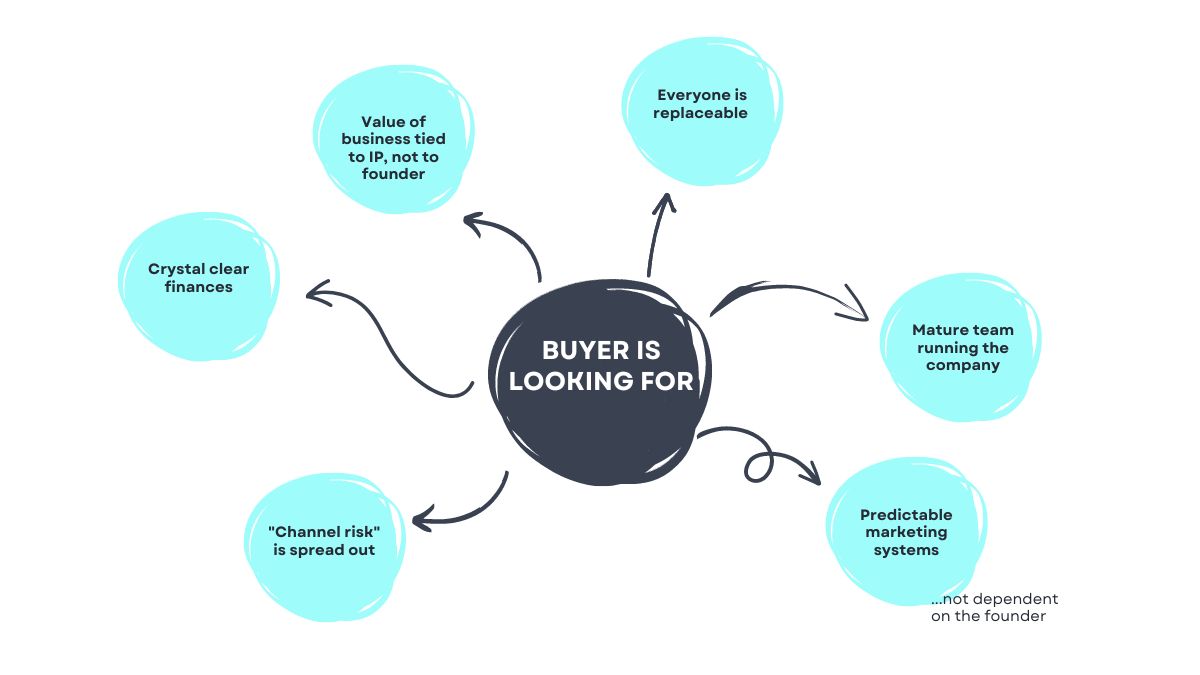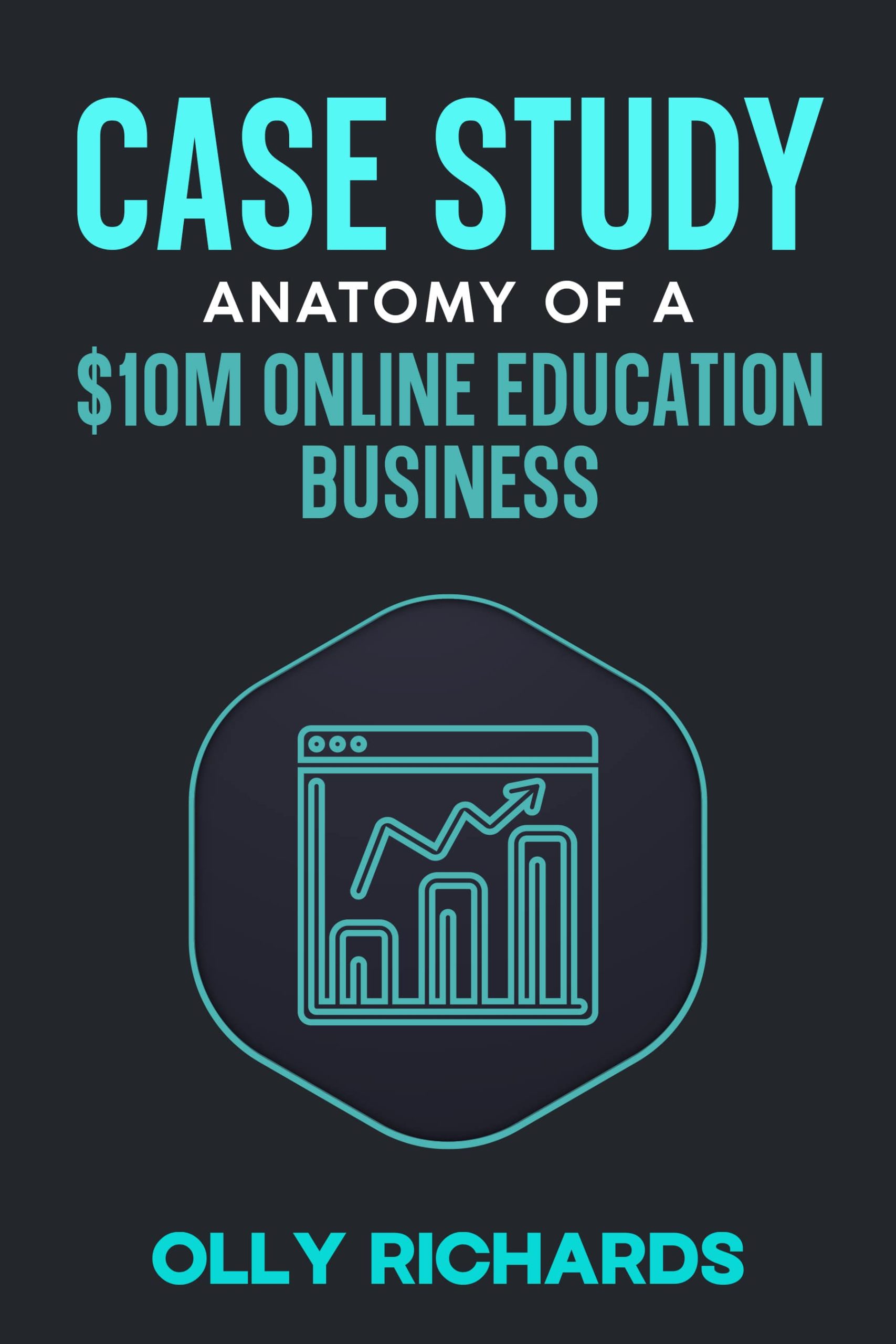Let's be honest for a moment --
You've fantasised about selling your online business before, haven't you?
It's okay...
Join the club.
(I won't tell anyone.)
But hold up -- you're not selling software, or physical thingamajigs...
Your business is... you.
You teach people. Using your ideas. And your content.
So is it actually possible to sell what you have?
That's what we're going to explore today.

Buying Educations Businesses For Fun & Profit
First up, I'll say this:
I've never sold a business.
(I'll tell you why later.)
But I have bought or invested into a tonne of them.
In fact, last year alone I bought or invested into seven separate online businesses, signing every deal from my desk here in Hobbitshire.
And in-so-doing, I've pored over a lot of data...
- balance sheets and P&Ls
- business history and past performance
- assets
- marketing strategies
And, frankly, I've waded through copious amounts of B.S. and wishful thinking from sellers about why their business is opportunity of the decade!
(Spoiler: Everyone thinks their business is worth at least 2X what it is.)
All of this is to say...
I know what a valuable business looks like.
And as the owner of multiple education businesses, I'm all too aware of the many pitfalls that face educators and creators when it comes to selling their baby.
Why Business Owners Sell
When someone sells an online businesses, it's usually for all the wrong reasons.
Here are some common reasons I see:
- The founder is burnt out
- Growth has stalled or is declining
- Co-founders have had a bust up
- The founders are have a baby and want more time
- Divorce is forcing an asset sale
...everything but: "I've grown the business to its natural potential and the next best strategic move is to sell, so that more experienced owners can take the business to the next stage."
Because a lot of these are emotional reasons, and can come on quite suddenly, it usually means that the business has not been prepared for a sale.
In other words... the business comes with all kinds of risks and inefficiencies, which we'll get into in a little while.
This doesn't mean that any business can't be sold. (If the buyer has all the info, they can go in with their eyes open.)
But it does create an inevitable gap in expectations:
- The buyer demands a good price to make up for the risks
- The seller still thinks their baby is the bomb, and wants far too much money
Ever bought or sold a house?
It's the same deal.
There is a loooot of ego involved in selling a business, in just the same way that a lot of emotions are wrapped up in a house.
In fact, a lot of the time, founders don't actually want to sell... they've just been swept up in hype from the startup world and have been hoodwinked into thinking that you haven't made it until you have a "successful exit".
Ugh...
Even writing these words makes me nauseous.
Earlier, I told you that I've never sold a business. The reason? I'd much rather own a bunch of cool high-cashflowing businesses, than sell everything and sail off into the sunset.
IMHO, sailing off into the sunset is sooo overrated.
I'd be bored within days.
In other words, if I've managed to build a successful business that I love (which is the case with storylearning.com, for example), then my preferred route is to build that business in such a way that it's fully-managed and can run without me.
That way, I still benefit financially...
But I can use my time in other ways, without being tied down to a business that relies on me to show up from 9-5pm.
I mean...
You're still going to find me flying my Robin DR400 at the local airfield twice a week, whether I own the business or not... so I may as well have dividends coming in every quarter to pay for it!
Here's why I bring this up...
Do you really want to sell your business?
My guess is not.
You probably just need a holiday.
You'd probably be miserable if you sold off the thing you built from scratch, and then had to watch it flourish in the hands of someone else.
But whatever...
It's not my job to tell you what you want.
But what I do think is interesting is this...
Whatever you want to do with your business eventually, you should build it *as if* you were going to sell it.
Because, as you'll see, the kind of things that investors actually look for in a well-run business are exactly what makes a business strong and stable in the first place.
And you do want a strong and stable business, don't you?
Of course you do...
How Valuable Is Your Business Really?
The wonder of the internet is that you can make a lot of profit as a single individual.
By making your knowledge available to an unlimited number of people online...
You can (in theory) have an unlimited number of customers.
Happy days.
This is great for you as an individual - you can make a lot of dough.
And because you make a healthy profit, you think:
"This is a valuable damn business!"
Here's the problem...
Take the expert (AKA you!) out of the equation, and there isn't much left.
As such, so-called "lifestyle" businesses are usually worth far more in the hands of the individual than they are in the hands of a new owner or investor.
Viewed from the investor perspective, here's how this dynamic plays out.
Here's what a typical education business looks like...

And then here's what a typical buyer or investor is looking for...

Can you see just how many obstacles there are for an investor to overcome before they can be confident about acquiring a business?
If you can appreciate this, then you can also see just how much stronger your business would be if you just implemented this stuff and worked towards making it more "sellable".
Whether or not you end up selling...
What you would be left with at the end of this process is a business that runs itself and that you can step back from entirely. (If you wanted to.)
I build all my businesses in this way now.
It's been one of the most valuable lessons of becoming an investor, actually -- learning how I should be building my own companies.
What Are Buyers Looking For?
Let's get down to some specifics.
When an investor or buyer is looking at your business, what are they actually looking for?
No, it's not your cool branding.
Or your unique teaching methodology.
Or even your team-bonding Zoom drinks every Friday
Buyers are investing in:
- A multiple of annual profits
- Growth potential
That's it.
In the case of a strategic buyer, there may be other "angles" they see in acquiring your business.
For example, if you're a fitness education company, then a supplement company may want to acquire you in order to sell their products to your audience. (I.e. they're buying your traffic.)
But in pure valuation terms, the value of your business is determined by a multiple of your profits.
(But not, remember, if the whole business is dependent on you!)
How does a buyer know what your profits are?
They look at your financial records - P&L and balance sheet. And they're typically going to want to see at least two years of numbers.
If you've been growing solidly for two years, it's a safe bet you'll continue to grow.
If, on the other hand, your numbers fluctuate wildly over that two-year period, they're going to be less confident.
The story of the business is told through the numbers.
So yes, it's a lengthy process to do it properly.
We're talking:
- 12 months to work yourself out of the business
- 12-24 months of financial records with new configuration
The other thing to bear in mind is that, when you work yourself out of the business, things will inevitably decline at first...
- Introducing a new host to a YouTube channel
- Hiring a second coach to deliver sessions
- Having a copywriter write emails instead of you
First, it's going to cost (a lot) more money.
Second, your sales are going to take a hit. (At first)
You may look at this and think...
"WHY BOTHER?!"
But, of course, although it's scary in the short term, what you're working towards with this is the ability to scale.
It becomes about *systems* rather than you. And *systems* can scale. (You can't). Which is, after all, the only reason that anyone is going to consider buying your business.
So...
If you decide to embark on this project, two things to make damn sure of before you begin:
- Have a lot of cash on hand (growth sucks cash)
- Give yourself at least 12 months to see it through
All good?
You ready for this?
Here's what to do..
8 Steps To Prepare Your Education Business For Sale
1. Have at least 12 months surplus cash in the bank - You're going to be spending money on systematising the business, and you don't want to go broke doing it.
2. Replace yourself in all content - This means videos, blog writing, podcasts... the whole shebang. Unless you're selling yourself along with the business, content needs to be produced without you.
3. Hire a CFO to prepare the accounts - Whether it's your accountant or a fractional CFO, you need someone who can prepare your business accounts to make sense to an investor. Messy accounts = messy organisation, and this will spook buyers fast.
4. Diversify your marketing channels - A lot of education businesses rely on one main marketing channel - usually the thing that made them successful in the first place. (Typically a blog, YouTube channel or podcast.) This is a big risk for a new owner - what happens if you get hit by an algorithm change? If you're a creator, add a paid acquisition channel (e.g. FB/IG or Google ads). If you've grown your business using ads, build a content channel so that there's a hedge against your advertising stopping working.
5. Rework all marketing to remove yourself - Completed step 4? Great. Now change every single reference to yourself on your website, emails, sales pages... the whole lot!
6. Hire a General Manager or COO - Anyone who buys your business does not want a new job along with it. They expect the business to continue running smoothly after your departure. So, who runs your business day-to-day? If the answer is *you*, then you'll need an operational manager to come in and run the ship. (This is probably the most important role you'll hire for.)
7. Replace "your magic" with the "ABC method" - This one's crucial if you're the expert figure within your business. "Businesses of one" are usually built around the expertise of the founder, and this makes the business unsellable if you walk out the door. Instead of selling "Bob's expertise", systematise that expertise, give it a name, and sell that instead - delivered by others, of course. For more on this, see chapter 1 of my Case Study of StoryLearning.com
8. Make an inventory of hats you wear - As founder, chances are you wear a whole bunch of hats within the business, from random admin to copywriting, to hiring. All of this needs to be rolled into someone else's role. If you hire a good ops manager (point 5), they can help with this.
As you can see, this is a lot of work.
And it's expensive.
I've spent the last couple of years doing this at StoryLearning, and I can attest to the pain-in-the-ass-ness of it all.
But if you're not in a rush, there's no reason it has to happen overnight.
And just look at what it gets you in return...
- a business that is fully managed by other people
- predictable marketing channels
- the ability to scale without you
- less stress, more free time
- finances that give you peace of mind
In my book, this is well worth doing even if you never plan to sell.
But if you do....
Well, you'll be fighting back hoards of crazed buyers waving fistfuls of cash in your direction.
What's not to love?
The Key to Selling Your Business (Without Leaving Money on The Table)
If you want to sell your education business, you need to understand the mind of the buyer.
Buyers may love your business...
But they'll turning over every mattress in search of risk -- things that could go wrong for them.
So it's not just about selling...
But selling for what the business is truly worth, and not leaving money - potentially large amounts of money - on the table.
It this post you've seen how this is going to take at least 12-24 months to carefully preparing all areas of the business so that it can run smoothly...
And continue to grow without you.
And if you want to see how I'm building a business that's doing just this, sign up below...
CASE STUDY: Blueprint Of A $10m Online Education Business:
Join my free newsletter for online educators and I'll send you the case study immediately...
We will protect your data in accordance with our data policy!


You make several smart points! #1? Systems! “The E-Myth” goes deep about this topic. Highly recommend!
Thanks, Olly!
PS: Looking forward to receiving/reading your Case Study!
Cheers Jer, enjoy the case study!